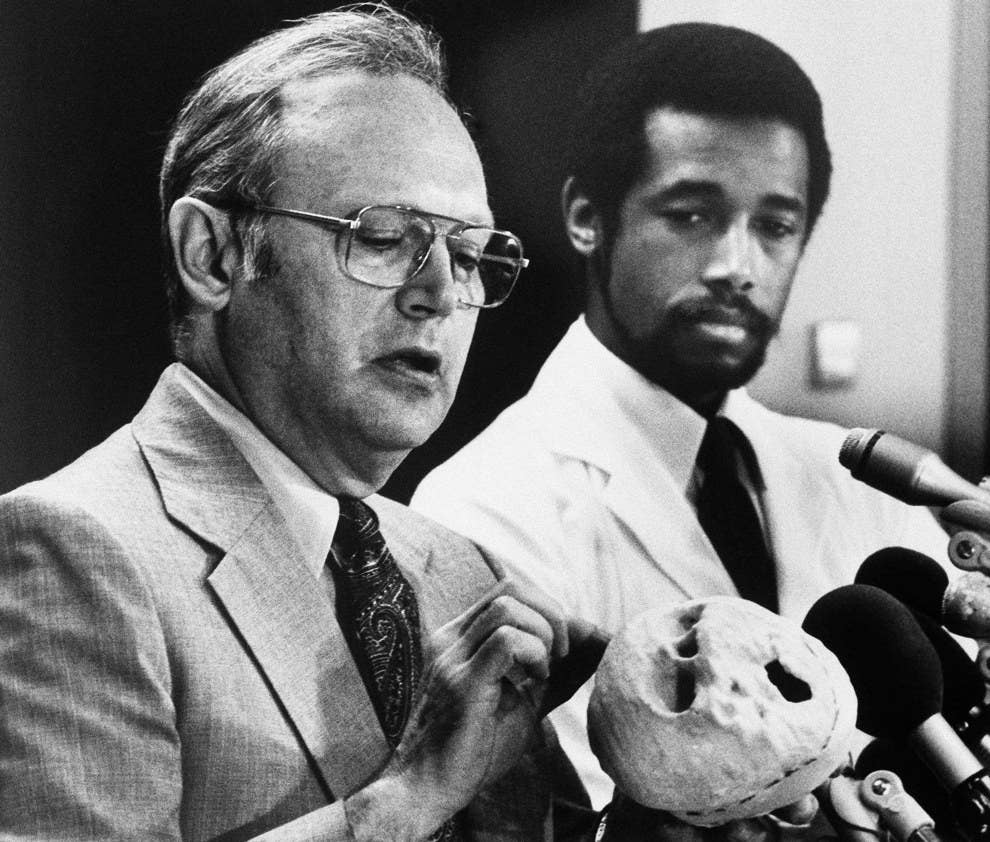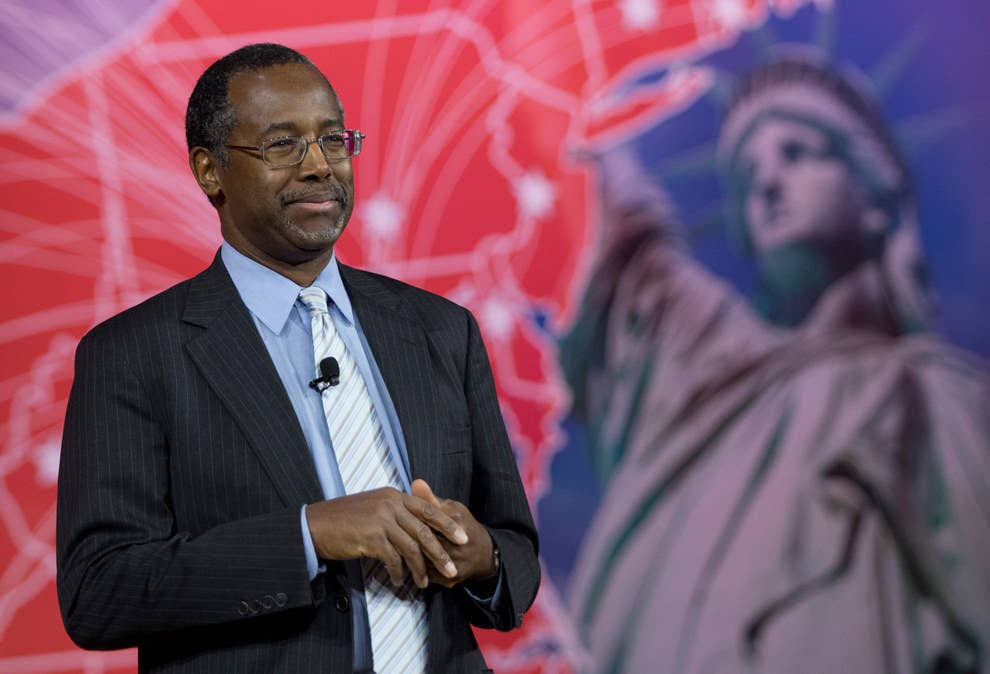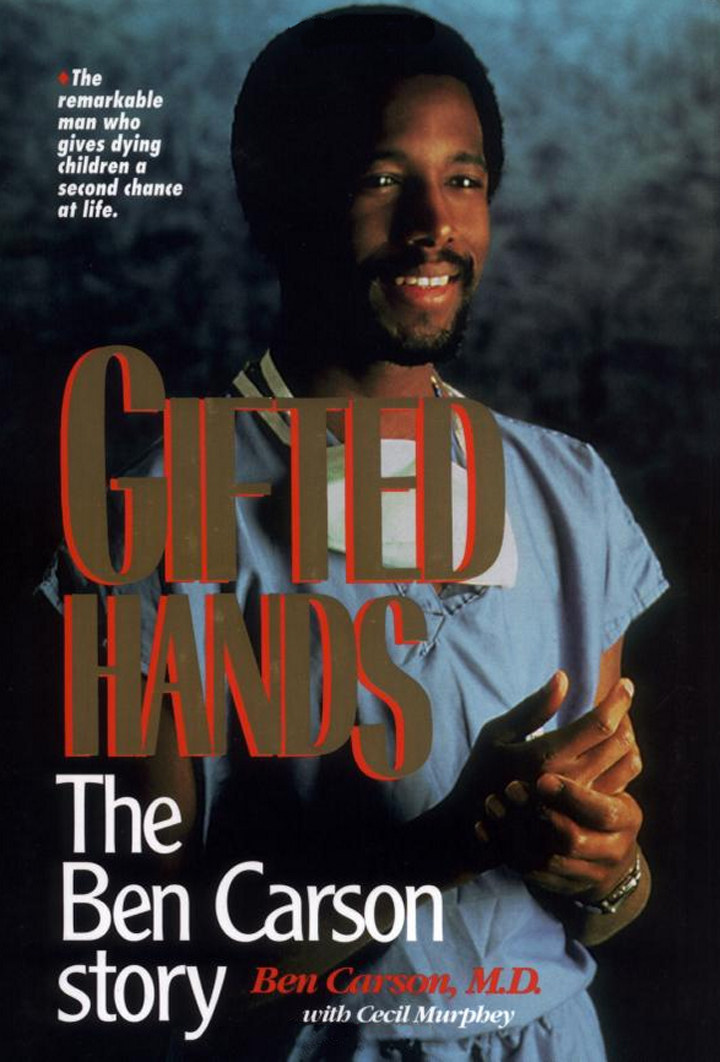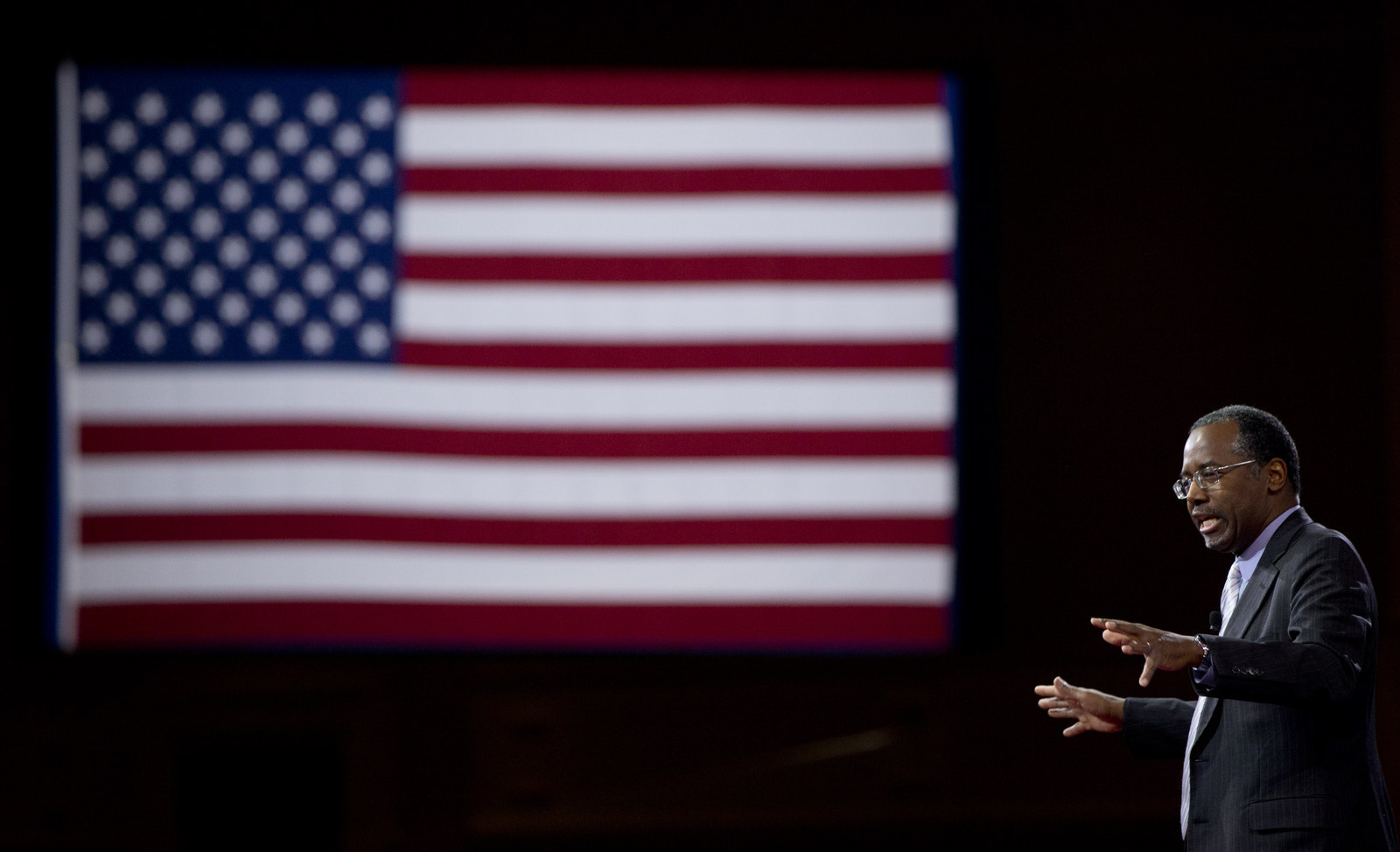
Maranda Francisco, forever 4 years old on the pages of Gifted Hands, is a brown-haired girl who suffered from a rare condition that caused her to have more than 100 seizures per day.
Her parents took her to Dr. Ben Carson at Johns Hopkins Hospital in Baltimore and allowed the young surgeon to perform a last-ditch, radical brain surgery that stopped the seizures and saved Maranda’s life. That was 1985.
“We kinda dropped off the face of the Earth,” her mother, Theresa Francisco, told BuzzFeed News. “She started to be known as the child with half a brain. We just didn’t want to do that anymore.”
Today, Maranda works at a Kroger grocery store in Big Lake, Minnesota — a town of 10,000 about 40 miles northwest of Minneapolis. She doesn’t have use of her right hand and walks with a limp, but she lives in her own apartment and is able to take care of herself. Now 33, Maranda is a triumph of both the human spirit and science.
A few weeks ago, her brother called to give her an update on Carson, whom Maranda hasn’t seen or spoken to in nearly 30 years.
“He was like, ‘I gotta tell you something. Your doctor is going to run for president,’” Maranda told BuzzFeed News. “I think that’s awesome. I think he’d do really good. All the things I have in life, I wouldn’t have if it wasn’t for Ben Carson.”
This is the unblemished view of Carson, a “folk hero” — a title he earned in a lengthy feature in the New York Times in 1993 — turned White House contender.
Carson hasn’t changed much, though the people evangelizing his story have. For the past 20 years, teachers and parents pressed his inspirational autobiography, Gifted Hands, into the hands of black children; today, conservatives far away from D.C., people who are not campaign operatives, see Carson as their champion — an intellectual social conservative.
The source of this allure is the same: Carson is a great American success story, a rags-to-riches hero who embodied achievement against long odds. His achievement turned him into an icon of black triumph, a Horatio Alger figure in hospital scrubs.
He didn’t do this through sports, music, or any of the other typical avenues to celebrity. He did it in a profession where the barrier for entry is extremely high, even among our best and brightest minds. It isn’t brain surgery? Well, for Carson, it actually was.
But he’s now risking this previously unassailable legacy in national politics, where reputations are broken as often as made. He’s making a series of sharp-edged statements that undermine his previously universal appeal, particularly in communities he once sought to set an example for. He has traded one kind of national stature for another one, hotter but also faster burning.
"If you’re white and you oppose a progressive black person, you’re a racist," Carson told the audience gathered for the annual Conservative Political Action Conference on Thursday. "If you’re black and you oppose the progressive agenda, you’re crazy."
Carson has already seen elements of his legend fall away. In one of the most painful, in March 2013, he was forced to withdraw as the commencement speaker at Hopkins after comparing same-sex marriage to bestiality and pedophilia, setting off a round of protests at a place where he’d worked, with much distinction, over five decades. This was a new turn for those who have long known Carson as famously soft-spoken at the hospital and fiercely protective of his privacy and time with family away from it. His former colleagues — to a person — bemoan his loss to the field of neurosurgery.
“He has never pushed anybody, never told anybody else what to do,” said Dr. Henry Brem, director of Hopkins’ neurosurgery department and a friend of Carson’s who joined the hospital’s staff with him on the same day in 1984. “And then there he is telling people how to fix the country. I realized, when he’s out there giving these public speeches, it’s a very different side of his personality.”
“The tack he took in recent years was a surprise to everybody,” said Elaine Freeman, a former longtime spokesperson for Hopkins, noting that Carson and her late husband often debated political issues away from the hospital. “The tenor changed.”
But tracing the trail of sound bites and dispatches given by Carson, the doctor nicknamed “Gentle Ben,” over the past quarter-century suggests Carson’s political turn is less a shift than a revelation. His values, his views, his way of looking at the world — they haven’t changed much.
“We had to read his books, and listen[ed] to his speeches and other public utterances,” said Vernon Robinson, campaign director of the National Draft Ben Carson for President Committee. “It’s a pain in the behind to do that but that's what you've got to do. It’s all there.”

In the rural community outside of Baltimore where Carson has lived for nearly 15 years, many of his neighbors claim to have never spoken to him. Some didn’t even know if Carson and his family still live in their seven-bedroom, $1.7-million house set on a 35-acre piece of pastureland between cornfields. They know, vaguely, that he bought another home in Florida (West Palm Beach) for retirement.
“I don’t even think he could win if he was running for mayor out here,” said one of his neighbors, who lives along the winding gravel road that leads to his palatial estate. “No one out here knows him. He tends to insulate himself.”
Carson and his staff didn’t respond to a number of interview requests. The youngest of his three sons, Murray, also declined comment when reached at the family home in Upperco, Maryland.
As he’s said in his book and in speeches, Carson was not bound for such a promising future.
His mother, Sonya, one of 24 children, was married at 13. Carson’s parents divorced when he was 8, leaving his mother — who was illiterate and had only a third-grade education — to raise him and his older brother Curtis. In inner-city Detroit, Carson said he was the worst student in his fifth-grade class.
But poor eyesight was responsible for many of his struggles. After he got glasses, Carson’s mother famously demanded that he read two books and watch no more than three TV shows per week. Carson went on to graduate third in his high school class and won an academic scholarship to Yale University, where he majored in psychology.
When Carson arrived at Johns Hopkins Hospital — ranked the top hospital in the country for two decades — as a neurosurgery resident in 1977, he said that he was sometimes mistaken for an orderly.
"It wasn't deliberately racist," he told the New York Times in 1993. "It's just that orderlies were the only black hospital employees these people had ever seen before."
Carson soon began collecting an impressive set of credentials: assistant professor of neurosurgery, assistant professor of oncology, and, at age 33, director of the Division of Pediatric Neurosurgery. He was then the nation’s youngest chief of pediatric neurosurgery, and one of only three black doctors in that position in the United States.
“He could walk into the patient’s room the evening before surgery, meet the parents for the first time, speak to them for a few minutes, and it was as if God had entered the room,” the late Dr. John Freeman, an internationally renowned Johns Hopkins pediatric neurologist, wrote in his self-published memoir Looking Back: A Career in Child Neurology.
“Many of the patients came to Hopkins because of Ben’s reputation, which was very well deserved. He is one of the very few individuals that I can honestly say ‘walks on water.’”
Because of this esteem, Carson often performed more than 400 operations a year — at the very high end of the caseload of a typical neurosurgeon. And his practice was particularly challenging: He dealt mostly with the most feeble patients (newborns and children) and the most severe conditions (tumors, traumatic brain injuries, congenital dwarfism, etc.).
Despite those difficulties, Carson appears to have maintained a very clean docket for a surgeon working in a specialty that ranks No. 1 for lawsuits, according to a study published in the New England Journal of Medicine in 2011. Records show only one malpractice suit and one other suit naming him and Johns Hopkins as defendants, both dismissed — though an appeal is pending in the former suit. The NEJM study shows that a neurosurgeon faces a 19.1% chance of facing a claim annually; or they should expect to be sued roughly every five years.
His gift with a forceps enabled thousands of suffering children to lead normal — or at least more normal — lives. It also launched him to public prominence. Carson had a story to tell — and eventually, sell.
Carson signed with a Christian publishing company and wrote Gifted Hands, the inspirational and influential autobiography that was published in 1990. Clocking in at little more than 200 pages, it was Carson’s wide-eyed prescriptive for underachievers who needed only better role models — Michael Jordan and Dr. Dre need not apply — and regular trips to the library.
He talked about overcoming his anger, which once resulted in stabbing a playmate when he was 9, by praying away his temper. He spent a chapter recounting how joining ROTC altered the course of his high school career, even helping him to understand that obsessing over fashion — “the peer thing,” he calls it — was immature. He recalled using a series of connections to land summer jobs while in college, discovering “influence could get me inside the door, but my productivity and the quality of my work were the real tests.”
Carson goes on to detail the sweet and chaste college courtship of his eventual wife, Candy; his meteoric rise through the ranks of medicine; the challenges of making time for his career and growing family. He also sprinkled biblical verses among the anecdotes and closed with a chapter explaining his motto T.H.I.N.K. B.I.G. (as in Talent/Time; Hope/Honesty; Insight; Nice; Knowledge; Books; In-Depth Learning; and God). The final paragraph reads: “Whatever direction we choose, if we can realize that every hurdle we jump strengthens and prepares us for the next one, we’re already on the way to success.”
It’s the kind of book Uncle Phil from The Fresh Prince of Bel Air might have given Will as a present.

Gifted Hands went on to become a staple among aspirational black families seeking to inspire their children and turned Carson into something of a Black History Month dignitary.
“He was clearly developing a following, traveling all over the country and giving talks,” said Elaine Freeman.
Unlike most other doctors who published books on issues within their field, “Ben always intended for his books to be widely read. He had a different purpose,” Freeman said.
Carson’s message was virtually indistinguishable from the sermons many in the audience might've heard from the pulpit of a black church. Carson could talk about personal responsibility and self-reliance and turning tragedy into triumph because of his familiar biography, echoing homilies delivered by men ranging from Malcolm X to T.D. Jakes.
Carson quickly set about pitching a prescription for struggling kids everywhere, railing against the exalted status of athletes, celebrities, and the most superficial aspects of popular culture. That peer thing, again.
“We have to look at what models are being put in front of our children — Michael Jordan and Madonna,” Carson told the Cleveland Plain-Dealer in 1997, echoing the tutelage his mother had given him as a struggling young student. “But we know very little about people who use their brains to benefit society.”
The stakes were especially high for children who had upbringings similar to his, Carson said. In a speech to the Housing Authority of Pittsburgh in 2007, Carson told the audience he discovered during his 25th high school reunion that all the "cool" people from those years were now dead.
A devout Seventh-Day Adventist, Carson took up this cause with the fervor of a barnstorming preacher. (In Carson’s home in Maryland, there is a portrait of him sitting alongside a beaming, brown-haired Jesus hanging over the stairwell. Jesus extends his left hand, as if beckoning to someone. They look like old friends.)
“He would talk about Michael Jordan and Michael Jackson, how those guys when they talked and went into a place, people got excited,” said Dr. Ron Anderson, an ophthalmologist at the Washington Hospital Center.
“It didn’t take long. Especially after his book came out and people knew who he was. He reached Jackson and Jordan in terms of walking into a school or an auditorium.”
He released more books, including two — Think Big (1996) and The Big Picture (2000) — that rehashed his philosophies for success. “And who could better advise than a man who has transformed himself from a ghetto kid into the most celebrated pediatric neurosurgeon in the world?” reads a description of Think Big on Amazon. Staying on message, and mostly avoiding contentious political talk, Carson touted the merits of hard work and faith in God. Some of the chapters in those books included titles like “Books Are For Reading,” “Seeing Hardship as Advantage,” and “Moving Beyond a Victim Mentality.”
In those final chapters of The Big Picture, there are also glimpses of the side of Carson the world would see years later when he delivered the keynote at a South Carolina tea party convention, an old-fashioned conservatism on race and other social questions. Carson wrote that he opposed affirmative action and criticized the use of racial and ethnic labels such as Irish-Americans, African-Americans, or “some other brand-Americans,” warning “if we are not careful we may fragment and hyphenate ourselves into oblivion.” He called political correctness “a serious threat” and said “it discourages honesty. It places a higher value on making everyone feel good than on stating what we really believe.” Carson also wrote “homosexual behavior is wrong” but that he had gay co-workers and “as long as they do their jobs well, their sexual orientation is not an issue I concern myself with.”
Carson spends the last 40 pages of the book diagnosing problems with the country’s health care system and prescribing a dramatic solution that would have socialized some elements of medicine and privatized others, a politically hard-to-place plan he’s since distanced himself from.
His proposals included elements now embraced by Republicans — a “loser pay legal fees” approach to malpractice lawsuits and allowing people to own their own health care policies; and also some now seen as of the political left, like government funding for catastrophic cases and the sort of national guidelines for who should and should not receive end-of-life care that Sarah Palin caricatured as “death panels.”
He also subtly criticizes then-first-lady Hillary Clinton’s health care initiative, saying, “I am not surprised that recent attempts at health-care reform have not been successful.”
In 1997, Carson loudly denounced a decision by the Maryland chapter of the NAACP to protest any and all public appearances by Supreme Court Justice Clarence Thomas. “It’s pretty disgusting,” he told The Star-Ledger. "I think it's time to move beyond that point. Slavery's been over for a long time now."
It wouldn’t really be until the National Prayer Breakfast in 2013 that Carson would catapult himself into public consciousness as a conservative leader. The 27-minute speech denounced Obamacare and progressive taxation as the president sat just 10 feet away. Months later at the Values Voters Summit, Carson would call Obamacare “the worst thing that has happened in this nation since slavery."
But even then, the Carson of old wasn’t so different. In 1997, at the very same event, he argued against affirmative action and the welfare state — standing in front of President Bill Clinton.
Brem, the Hopkins doctor, could hardly believe Carson, a man whom he described as “soft-spoken, mild-mannered, and incredibly polite,” was the same person who was challenging President Clinton in front of roughly 3,000 attendees.
“I almost fell out of my chair,” Brem said, recalling watching Carson open a chasm between himself and the president of the United States. “It was so shocking.”

Those who read his earlier books also wouldn’t be too surprised that Carson seems poised to pursue a political career. In The Big Picture, Carson somewhat offhandedly mentions that government might benefit from an infusion of physicians, particularly on issues relating to health care.
“I can’t help believing our modern culture would be better served if more doctors were better public servants,” he wrote.
That time might yet come for Carson. But the work he is truly known for, a series of operations that are complicated, risky, and often lifesaving — is the kind of thing that most humans never do, let alone presidential candidates. (On Hopkins’ website, Carson has an 84-page resume that includes nearly 20 pages of honors and 68 honorary degrees from schools as diverse as Morgan State University in Baltimore and Medical University of Southern Africa.)
Carson's more extreme comments in recent years — particularly those about gays and lesbians — have unsettled some former colleagues.
“The thing that’s crazy is that he’s trained more gay neurosurgeons than anybody in the country,” Brem said. “He works beautifully with people.”
Carson’s longtime friends and colleagues are concerned about how his turn to politics is affecting his legacy. In an email thread among Hopkins employees accidentally shared with BuzzFeed News, one former colleague recommend “speaking to [BuzzFeed News] without getting drawn into political discussion.”
It was Carson’s role in successfully separating conjoined twins in 1987 that first turned him into a national figure.
“This sorta nailed down the top of the box that said this guy is special,” said Dr. J. Alex Haller, the former director of pediatric surgery at Hopkins who helped bring Carson to Hopkins in the 1970s.
When the parents of the twins, Patrick and Benjamin Binder of Ulm, Germany, requested to have their boys operated on at Hopkins, “no one had successfully separated Siamese twins joined at the back of the cranium with both surviving,” Carson wrote in Gifted Hands. But the Binders “learned that if the boys remained attached they would never sit, crawl, turn over, or walk. The two beautiful children would remain bedridden and relegated to lying on their backs for as long as they lived. Not much of a prospect for them.”
The procedure lasted 22 hours and involved 70 physicians, nurses, and assistants, and at least that many staff members waiting to support the team outside the operating room.
“Once out of the operating room, exhaustion took over, and we wanted to collapse,” Carson wrote in Gifted Hands. “In the minutes after surgery, I couldn’t think of answering anybody’s questions or talking about what we had done.”
Carson wouldn’t be able to avoid questions for long. The waiting room had been filled with reporters; several local radio stations gave hourly updates on the surgery; and a press conference — “the room was wall-to-wall reporters with cameras and microphones,” Carson wrote in Gifted Hands — awaited him following a short rest.
Watching from home in Washington, D.C., a friend thought he saw a familiar face among the mostly homogenous crowd.
“It was white guys in white coats and then I see this black guy and said, ‘Oh, he must be an orderly,’” said Anderson, his longtime friend. “He had scrubs on. Then I realized it was Ben.”
Carson might not have been selected for the operation that made him famous had it not been for his groundbreaking surgery on Maranda in 1985.
When the Franciscos brought Maranda to Carson, they had run out of all other options. Maranda had been in and out of hospitals most of her young life, suffering from a rare brain disease called Rasmussen's encephalitis. The disease “progressively leads to permanent paralysis on one side of the body, mental retardation, and then death,” Carson wrote in Gifted Hands.
“It was a gift that I found him actually. We had nowhere else to go,” Theresa Francisco told BuzzFeed News. “He said, ‘I would be willing to look at your daughter. But I can’t promise anything. When can you be here?’”
Once the family arrived in Baltimore, they discussed the only remaining option for Maranda: a procedure known as hemispherectomy, the removal of half the brain in a child who is plagued by seizures that do not respond to drugs.
The hemispherectomy, first developed in the 1930s, fell into disfavor by the 1970s because of the side effects, including permanent brain damage, and an extremely high mortality rate. The odds of failure with were high, if not likely, but Carson believed the procedure was worth reviving in this case. “We surely had nothing to lose with Maranda,” Carson said in Gifted Hands. “If we didn’t proceed with the hemispherectomy, death was inevitable. We were at least giving this pretty little girl a chance to live.”
Theresa Francisco handed over her little girl to Carson, by now convinced he was her only remaining option. First, she had been surprised by his youth. Soon she was soothed by his calm and confident rapport with the family and Maranda.
“He was very soft-spoken, very calm, just very believable,” Theresa Francisco said. “And as far as I know, he’s still like that to this day. Nothing seems to rattle him.”
In the footnotes of Gifted Hands’ chapter about Maranda, Carson explained why he believed he’d be successful with a procedure that offered only the dimmest hopes for success.
“I suggest two reasons for the high failure rate,” Carson wrote. “First, the surgeons selected many inappropriate patients for the operation who, consequently, did not do well afterward. Second, the surgeons lacked competence or effective skills.” Left unsaid, but generally understood: Those surgeons weren’t as gifted as him.
Maranda survived the procedure, even regaining her speech immediately after surgery. And though she needed years of physical therapy and other treatment, Maranda graduated from high school in 2000 and “moved out on my own and have pretty much been independent,” she said.
“I wanted to live a normal life and that’s what I have. That’s all thanks to Dr. Carson.”
“It’s funny to hear people say, ‘This guy Ben Carson; I really like him and he might run for president. Do you know him at all?'” Theresa Francisco said, laughing. “Actually I do. I know him personally.
“He’s the same old Dr. Carson.”
